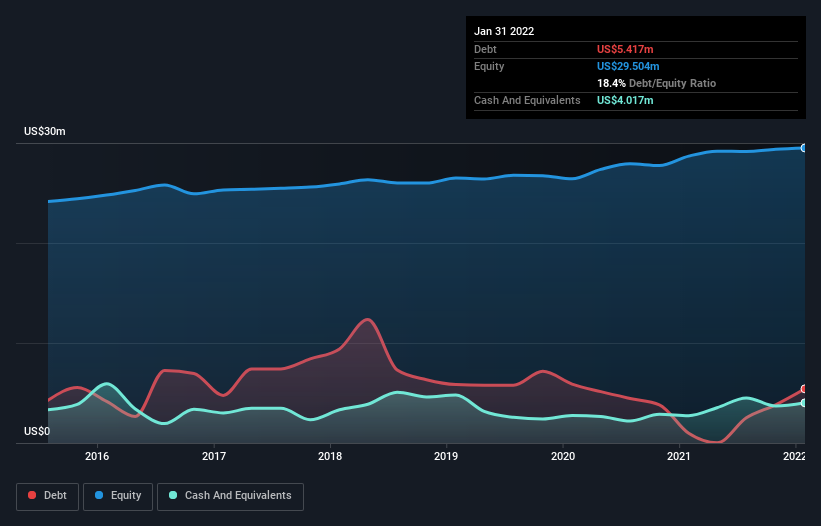
Warren Buffett famously said, 'Volatility is far from synonymous with risk.' When we think about how risky a company is, we always like to look at its use of debt, since debt overload can lead to ruin. We can see that Coffee Holding Co., Inc. (NASDAQ:JVA) does use debt in its business. But should shareholders be worried about its use of debt?
What Risk Does Debt Bring?
Debt and other liabilities become risky for a business when it cannot easily fulfill those obligations, either with free cash flow or by raising capital at an attractive price. In the worst case scenario, a company can go bankrupt if it cannot pay its creditors. However, a more frequent (but still costly) occurrence is where a company must issue shares at bargain-basement prices, permanently diluting shareholders, just to shore up its balance sheet. Of course, debt can be an important tool in businesses, particularly capital heavy businesses. The first thing to do when considering how much debt a business uses is to look at its cash and debt together.
View our latest analysis for Coffee Holding
How Much Debt Does Coffee Holding Carry?
You can click the graphic below for the historical numbers, but it shows that as of January 2022 Coffee Holding had US$5.42m of debt, an increase on US$973.9k, over one year. However, it does have US$4.02m in cash offsetting this, leading to net debt of about US$1.40m.

How Strong Is Coffee Holding's Balance Sheet?
According to the last reported balance sheet, Coffee Holding had liabilities of US$10.5m due within 12 months, and liabilities of US$3.55m due beyond 12 months. Offsetting this, it had US$4.02m in cash and US$8.54m in receivables that were due within 12 months. So it has liabilities totalling US$1.46m more than its cash and near-term receivables, combined.
Of course, Coffee Holding has a market capitalization of US$16.2m, so these liabilities are probably manageable. But there are sufficient liabilities that we would certainly recommend shareholders continue to monitor the balance sheet, going forward.
In order to size up a company's debt relative to its earnings, we calculate its net debt divided by its earnings before interest, tax, depreciation, and amortization (EBITDA) and its earnings before interest and tax (EBIT) divided by its interest expense (its interest cover). This way, we consider both the absolute quantum of the debt, as well as the interest rates paid on it.
Coffee Holding has a low net debt to EBITDA ratio of only 0.55. And its EBIT covers its interest expense a whopping 21.0 times over. So we're pretty relaxed about its super-conservative use of debt. Even more impressive was the fact that Coffee Holding grew its EBIT by 112% over twelve months. If maintained that growth will make the debt even more manageable in the years ahead. The balance sheet is clearly the area to focus on when you are analysing debt. But you can't view debt in total isolation; since Coffee Holding will need earnings to service that debt. So if you're keen to discover more about its earnings, it might be worth checking out this graph of its long term earnings trend.
Finally, a business needs free cash flow to pay off debt; accounting profits just don't cut it. So it's worth checking how much of that EBIT is backed by free cash flow. Over the last two years, Coffee Holding actually produced more free cash flow than EBIT. That sort of strong cash conversion gets us as excited as the crowd when the beat drops at a Daft Punk concert.
Our View
The good news is that Coffee Holding's demonstrated ability to cover its interest expense with its EBIT delights us like a fluffy puppy does a toddler. And the good news does not stop there, as its conversion of EBIT to free cash flow also supports that impression! It looks Coffee Holding has no trouble standing on its own two feet, and it has no reason to fear its lenders. For investing nerds like us its balance sheet is almost charming. When analysing debt levels, the balance sheet is the obvious place to start. But ultimately, every company can contain risks that exist outside of the balance sheet. Case in point: We've spotted 4 warning signs for Coffee Holding you should be aware of, and 1 of them is potentially serious.
At the end of the day, it's often better to focus on companies that are free from net debt. You can access our special list of such companies (all with a track record of profit growth). It's free.
New: AI Stock Screener & Alerts
Our new AI Stock Screener scans the market every day to uncover opportunities.
• Dividend Powerhouses (3%+ Yield)
• Undervalued Small Caps with Insider Buying
• High growth Tech and AI Companies
Or build your own from over 50 metrics.
Have feedback on this article? Concerned about the content? Get in touch with us directly. Alternatively, email editorial-team (at) simplywallst.com.
This article by Simply Wall St is general in nature. We provide commentary based on historical data and analyst forecasts only using an unbiased methodology and our articles are not intended to be financial advice. It does not constitute a recommendation to buy or sell any stock, and does not take account of your objectives, or your financial situation. We aim to bring you long-term focused analysis driven by fundamental data. Note that our analysis may not factor in the latest price-sensitive company announcements or qualitative material. Simply Wall St has no position in any stocks mentioned.
About NasdaqCM:JVA
Coffee Holding
Engages in manufacturing, roasting, packaging, marketing, and distributing roasted and blended coffees in the United States, Australia, Canada, England, and China.
Solid track record with excellent balance sheet.
Similar Companies
Market Insights
Community Narratives



